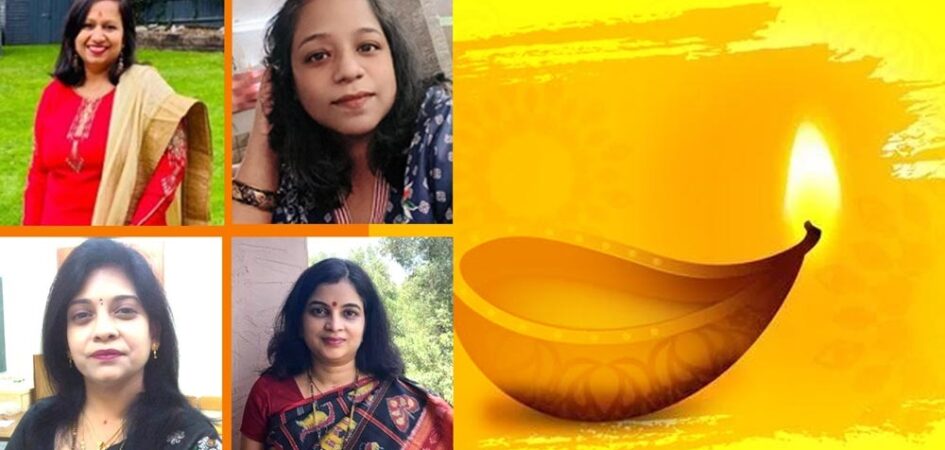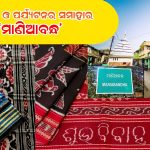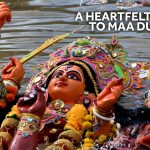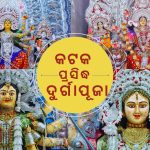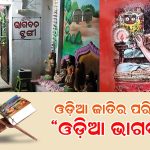Diwali, the festival of lights, is celebrated all across India with great grandeur. It is a time of reunion, hustle-bustle, fun and frolic, creating interesting memories and enjoying an array of sweets. However, it is also a time of the year for Non-Resident Indians (NRIs) to feel homesick. Missing the joys of celebrating with the community and realizing the love and significance of their hometowns is unmatched during such festivals.
Let take a look at what some of the Odia NRIs have to say about Diwali and how they celebrate it abroad in their current place of residence.
Swati Sangeria, resident of Amersham, Buckinghamshire, England
Diwali is the most popular Indian festival abroad – so much so that in the past few years, we have been asking for a bank holiday to be declared on Diwali ! We do miss family and the festive food, but the void of family is filled up by friends coming together to celebrate. Even our British friends and neighbours make efforts to wish us and participate whenever invited. Festive food is now becoming more prevalent due to increase in demand and number of home cooks. Schools talk about Diwali in assemblies and conduct lamp making crafts showing inclusivity and religious diversity. Fireworks are available during this time, due to its proximity with Guy Fawkes/Fireworks night and children are always excited to have fun in gardens and at social gatherings. Although it’s different than things are back home, it does feel like a global festival and availability of video chats and social media makes us feel we are totally in the scene with folks in Odisha and elsewhere.
Sushrita Satapathy, resident of Sohar, Oman
Diwali does not need an introduction at all. The festival of lights is celebrated with a lot of enthusiasm with sweets, lights and crackers. Diwali has changed a lot over the past few years. Earlier our mothers and grandmothers used to make traditional Odia sweets like kakara pitha at home. We used to put oil in earthen diyas and decorate it outside our entrances and re-light them every few hours. Bursting crackers was the essence of Diwali celebrations. But now we celebrate the festive occasion by decorating our houses with electric lights and candles. Environmental green Diwali is trending everywhere. Since I am staying in Oman, I celebrate Diwali with the same festive spirit. The pooja tradition stays intact and brings together all our Odia friends back from their busy schedules. The flower and rangoli décor at home on this occasion stays the same. We all dress up in Indian ethnic wear, prepare sweets and other Odia dishes at our home. No matter where we live, we will always cherish our tradition and keep the festive spirit shining bright like the Diwali diya.
Pragnya Mohanty, resident of Muscat, Oman
Diwali signifies victory of light over darkness. It is celebrated throughout India in the last five days of Kartika month of Hindu Lunar calendar. Hindus celebrate as Lord Rama returned to Ayodhya after 14 years of exile. Also, Lord Krishna killed demon Narakasura and freed 16,000 girls captured by him. Jains observe “Mahavira Nirvana Divas”, the physical death and final nirvana of Mahavira. Sikhs celebrate Bandi Chhor in remembrance of Guru Hargobind’s arrival to Golden Temple in Amritsar after his release from the captivity of Jahangir. Goddess Lakshmi, the goddess of wealth, chose to wed Lord Vishnu on Diwali night. In eastern India, Goddess Kali is worshipped and in the western state of Gujarat both Goddess Saraswati (for knowledge and music) and Kubera (for wealth management) are revered. In a typical Odia family, Deepavali starts with cleaning and white washing the homes, spreading beautiful multicolor Rangoli and lighting Deepa (Diya). Odisha has its own ritual for deepavali called Bada Badua Daka, where prayer is offered to our forefathers and ancestors by lighting jute sticks and chanting.
We celebrate Diwali in Oman with friends but in Odisha we always had a larger gathering of family to enjoy the occasion.
Meenakshi Satapathy, resident of Sohar, Oman
Festival of Lights, Diwali is celebrated worldwide. Now it’s not confined only to India.
In Oman, on the occasion of Diwali, a spectacular display of sparkling LED lights is the highlight of the celebrations. Colourful rangolis are displayed at the entrance of every household. Evening time, all gather at the community hall nearby, where various cultural events are organized. Along with the events, very few fire crackers are burst and Diwali sweets and snacks are distributed among the gathered members. Exchanging gifts also proves to be a dominant ritual.
Actually we miss the holidays which we get during these festive times in Odisha. In India it’s a declared public holiday and people engage in exchanging gifts and organising parties on a large scale. Schools and colleges remain closed. Here in Oman, it’s like any other usual day.
Children love it for the delicious sweets and colourful crackers, grown-ups love it for getting some time to spend with their families and friends.
Being an NRI what do you miss most during Diwali? Please let us know about your thoughts on the same in the comment section below.
Diwali, the festival of lights, is celebrated all across India with great grandeur. It is a time of reunion, hustle-bustle, fun and frolic, creating interesting memories and enjoying an array of sweets. However, it is also a time of the year for Non-Resident Indians (NRIs) to feel homesick. Missing the joys of celebrating with the community and realizing the love and significance of their hometowns is unmatched during such festivals.
Let take a look at what some of the Odia NRIs have to say about Diwali and how they celebrate it abroad in their current place of residence.
Swati Sangeria, resident of Amersham, Buckinghamshire, England
Diwali is the most popular Indian festival abroad – so much so that in the past few years, we have been asking for a bank holiday to be declared on Diwali ! We do miss family and the festive food, but the void of family is filled up by friends coming together to celebrate. Even our British friends and neighbours make efforts to wish us and participate whenever invited. Festive food is now becoming more prevalent due to increase in demand and number of home cooks. Schools talk about Diwali in assemblies and conduct lamp making crafts showing inclusivity and religious diversity. Fireworks are available during this time, due to its proximity with Guy Fawkes/Fireworks night and children are always excited to have fun in gardens and at social gatherings. Although it’s different than things are back home, it does feel like a global festival and availability of video chats and social media makes us feel we are totally in the scene with folks in Odisha and elsewhere.
Sushrita Satapathy, resident of Sohar, Oman
Diwali does not need an introduction at all. The festival of lights is celebrated with a lot of enthusiasm with sweets, lights and crackers. Diwali has changed a lot over the past few years. Earlier our mothers and grandmothers used to make traditional Odia sweets like kakara pitha at home. We used to put oil in earthen diyas and decorate it outside our entrances and re-light them every few hours. Bursting crackers was the essence of Diwali celebrations. But now we celebrate the festive occasion by decorating our houses with electric lights and candles. Environmental green Diwali is trending everywhere. Since I am staying in Oman, I celebrate Diwali with the same festive spirit. The pooja tradition stays intact and brings together all our Odia friends back from their busy schedules. The flower and rangoli décor at home on this occasion stays the same. We all dress up in Indian ethnic wear, prepare sweets and other Odia dishes at our home. No matter where we live, we will always cherish our tradition and keep the festive spirit shining bright like the Diwali diya.
Pragnya Mohanty, resident of Muscat, Oman
Diwali signifies victory of light over darkness. It is celebrated throughout India in the last five days of Kartika month of Hindu Lunar calendar. Hindus celebrate as Lord Rama returned to Ayodhya after 14 years of exile. Also, Lord Krishna killed demon Narakasura and freed 16,000 girls captured by him. Jains observe “Mahavira Nirvana Divas”, the physical death and final nirvana of Mahavira. Sikhs celebrate Bandi Chhor in remembrance of Guru Hargobind’s arrival to Golden Temple in Amritsar after his release from the captivity of Jahangir. Goddess Lakshmi, the goddess of wealth, chose to wed Lord Vishnu on Diwali night. In eastern India, Goddess Kali is worshipped and in the western state of Gujarat both Goddess Saraswati (for knowledge and music) and Kubera (for wealth management) are revered. In a typical Odia family, Deepavali starts with cleaning and white washing the homes, spreading beautiful multicolor Rangoli and lighting Deepa (Diya). Odisha has its own ritual for deepavali called Bada Badua Daka, where prayer is offered to our forefathers and ancestors by lighting jute sticks and chanting.
We celebrate Diwali in Oman with friends but in Odisha we always had a larger gathering of family to enjoy the occasion.
Meenakshi Satapathy, resident of Sohar, Oman
Festival of Lights, Diwali is celebrated worldwide. Now it’s not confined only to India.
In Oman, on the occasion of Diwali, a spectacular display of sparkling LED lights is the highlight of the celebrations. Colourful rangolis are displayed at the entrance of every household. Evening time, all gather at the community hall nearby, where various cultural events are organized. Along with the events, very few fire crackers are burst and Diwali sweets and snacks are distributed among the gathered members. Exchanging gifts also proves to be a dominant ritual.
Actually we miss the holidays which we get during these festive times in Odisha. In India it’s a declared public holiday and people engage in exchanging gifts and organising parties on a large scale. Schools and colleges remain closed. Here in Oman, it’s like any other usual day.
Children love it for the delicious sweets and colourful crackers, grown-ups love it for getting some time to spend with their families and friends.
Being an NRI what do you miss most during Diwali? Please let us know about your thoughts on the same in the comment section below.
